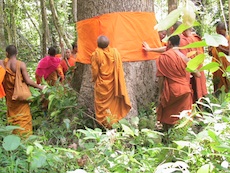| |
|
 |
Monks' Community Forest in Cambodia wins prestigious Equator Prize
September 17, 2010:
Monks Community Forest-ARC PRESS RELEASE: September 17th 2010
A group of Buddhist monks in northwest Cambodia has won the United Nations Development Programme-sponsored Equator Prize celebrating outstanding community efforts to conserve biodiversity and reduce poverty.
Venerable Bun Saluth joins the other 24 of this year’s winners to receive the prize and US$5,000 in an award ceremony in New York on September 20th at the American Museum of Natural History in the presence of many Heads of States.
This is one of the most prestigious prizes in the international environment world. Only 25 are awarded every two years.
Almost every morning Ven Saluth and his fellow monks set out from their pagoda soon after dawn on motorbikes to patrol the forest and protect it from illegal logging and land incursion. They have been doing so since 2001, when Ven Saluth, seeing the extent of Cambodia’s ongoing forest destruction, sought official approval to protect 18,261 hectares of rare lowland evergreen forest in his local region. This “Monks Community Forest” is now one of the largest and best-protected community managed forests in Cambodia.
Armed with this belief, but little else, and in the face of often dangerous forces, these monks have proven themselves to be powerful conservationists.
After acquiring legal protection of the forest, step by step over the last decade, they have successfully demarcated forest boundaries, raised environmental awareness among local communities, developed co-management committees with local villagers, linked with government authorities and non governmental organizations (NGOs. They have also significantly reduced forest crime in the Monks Community Forest through the development of unique approaches to law enforcement based on Buddhist principles.
 |
 |
 |
Ordaining trees in the forest to protect them |
According to Ven Saluth: “The tree is a symbol of life, and sacred to Buddhists: The Buddha was born under the tree, attained enlightenment under the tree, and died under the tree.“
The monks’ efforts are driven by the belief that by protecting forests and wildlife, (and through them the resources upon which local communities depend) they are following the principles the Buddha set out in his teachings “to eliminate the suffering of all beings and to live ethically according to virtues such as non-violence, compassion, generosity and simple living”. The monks also point to the close connection of the Buddha’s life with nature, and how the major events of his life – birth, enlightenment, and death - all occurred in the forest.
The ability of these “Engaged Buddhists” to deter forest crime and to touch the hearts and minds of their community is a vivid demonstration of the role of faith in conservation. The monks have inspired a conservation ethic among villagers living near the Monks Community Forest by explicitly linking nature conservation to the life of the Buddha and by explaining the benefits of protection. Impressed by the monks’ dedication to forest protection, 40 people from six villages have stepped forward to participate in co-management committees and to voluntarily patrol with the monks to protect the wildlife and resources of the Forest. They now have access to non-timber forest products and to agricultural support that directly benefit their livelihoods.
In recent years the Cambodian Forestry Administration and PACT Cambodia have provided some support to the Monks Community Forest and they are now working with them and 12 other community forests on one of Cambodia’s first carbon offset projects. The Alliance of Religions and Conservation (ARC), with Interfaith Power and Light, have also provided general support.
This small forest community in northwest Cambodia is now linked with 128 other Equator Prize winners from around the world who have been chosen as representatives of best practices in grassroots movements that combine biodiversity conservation and poverty reduction.
According to director of the Alliance of Religions and Conservation, Martin Palmer: “The rise of awareness in the environmental movement of the significance and impact that faith communities are already having in protecting the environment is wonderfully illustrated by this award. At last we see the faiths taking their rightful place amongst the champions of local communities in our efforts to preserve a living planet.
The Cambodian example is particularly moving because under the Khmer Rouge every effort possible was made to destroy the role of religion and in particular Buddhism in the country. The return and revival of Buddhism and the central role it plays in reconstructing Cambodia is a moving story of quiet determination, patience and the wisdom of nearly 2000 years of following the teachings of the Buddha.”
Other winning projects include the Miliru farmers of Kenya and an Amazonian ecotourism project from Ecuador.
For more information contact: Chantal Elkin on chantalelkin@gmail.com or the Communications team at ARC on 44 1225 758004
PHOTOSSee our Flickr site. Please credit Chantal Elkin, ARC
LINKS:
Association of Buddhists for the Environment.
PACT Cambodia.
|
 |
 |
|
|
|
|
|
 |
Cambodia's pagodas become eco-centres
The re-emerging centres of community life in Cambodia are often the pagodas. Monks and nuns are helping people claim the right to education, and guiding them to protect and improve their environment, |
 |
What do Buddhists believe?
The basic teachings of Buddhism |
 |
November 10, 2020:
Sacred Soil: the foundation of life
We rarely think about the soil beneath our feet; we certainly don’t consider that one inch of "dirt" contains billions of living organisms or that healthy soil is literally the foundation of life. That sacred connection between soil, life, faith and our relationship with all creation was the theme of this year’s 15th annual Festival of Faiths at Louisville, Kentucky. |
 |
 |
|
|

